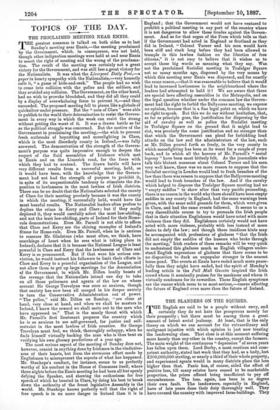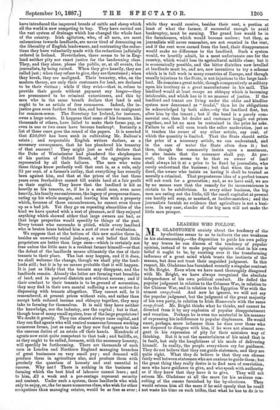THE SLANDERS ON THE SQUIRES.
THE English are said to be a people without envy, and certainly they do not hate the prosperous merely for their prosperity ; but there must be among them a great amount of latent social jealousy. At least, that is the only theory on which we can account for the extraordinary and malignant injustice with which opinion is just now treating the landowning class. That class is at this moment suffering more keenly than any other in the country, except the farmers. The main weight of the continuous " depression " of seven years has fallen upon them. Lord Derby, a most cautious and com- petent authority, stated last week that they had, as a body, lost
300,000,000 sterling, or nearly a third of their whole property, and experienced agents would in many districts place the loss higher than that. Panic has, of course, aided the effect of positive loss, till many estates have ceased to be marketable properties, the prices offered being insufficient to pay off encumbrances. The loss, again, has been in no degree their own fault. The landowners, especially in England, have of late years done their duty thoroughly well. They have covered the country with improved farm-buildings. They have introduced the improved breeds of cattle and sheep which all the world is now competing to buy. They have carried out the vast system of drainage which has changed the whole face of the country. Irish agitators, who, of all men, are most calumnious towards landlords, are never tired of descanting on the liberality of English landowners, and contrasting the reduc- tions they have voluntarily made with the reductions judicially ordered in Ireland. Nevertheless, there seems to be in Eng- land neither pity nor exact justice for the landowning class. They, and they alone, please the public, or, at all events, the journalists, by being ruined. When they give heavily, they are called just ; when they refuse to give, they are threatened ; when they break, they are maligned. Their tenantry, who, on the modern theory, are only their customers for land, are declared to be their victims ; while if they evict—that is, refuse to provide their goods without payment any longer—they are pronounced to be criminal extortioners, and this by men who in the same breath declare that land is and ought to be an article of free commerce. Indeed, the in- justice goes even further than this, and becomes too malignant for oommon•eense. The Secretary for Ireland, for instance, owns a large estate. It happens that some of his farmers, like thousands of others, have failed to make their farms pay, or even in one or two cases have become bankrupt. Instantly a list of these cases goes the round of the papers. It is asserted that £50,000 has been sunk in cultivating Mr. Balfour's estate ; and respectable English writers declare, as a necessary consequence, that he has plundered his tenantry of that amount I They might just as well declare that the Duke of Westminster had plundered the shopkeepers of his portion of Oxford Street, of the aggregate sum represented by all their failures. The men who write these things know perfectly well that rent is, as a rule, only 33 per cent, of a farmer's outlay, that everything has recently been against him, and that at the prices of the last three years even freeholders cannot till arable land at a fair profit on their capital. They know that the landlord is hit as heavily as his tenants, or, if be is a small man, even more heavily, his family encumbrances, the legacy of prosperous times, eating up his whole margin, and leaving him with a property which, because of those encumbrances, he cannot even throw up as a bad job. Yet they go on repeating absurdities of the kind we have quoted with a sort of pleasure, as if they enjoyed anything which showed either that large owners are bad, or that large properties would speedily be things of the past. Every tenant who succumbs is pitied, while every landlord who is beaten hears behind him a sort of crow of exultation.
We suppose that at the bottom of this new malice there is, besides an unworthy social jealousy, a real belief that little proprietors are better than large ones—which is certainly not tree unless the little man is a resident farmer himself—or that the defeat of the landlords means ultimately the rise of their tenants to their place. The last may happen, and if it does, we shall welcome the change, though we shall pity the land- lords still ; but it is by no means probable that it will happen. It is just as likely that the tenants may disappear, and the landlords remain. Already the latter are farming vast breadths of land, and in pastoral districts not without success ; and if their conduct to their tenants is to be ground of accusation, they may find in their own mental suffering a new motive fcr dispensing with tenants altogether. They cannot sell, be it remembered, at present prices without ruin, and rather than accept both reduced income and obloquy together, they may take to farming for themselves. It is said they have neither the knowledge, nor the industry, nor the capital ; but is that, though true of many small squires, true of the large proprietors? We doubt it greatly. They can almost always raise capital, and they can find agents who will control numerous foremen working numerous farms, just as easily as they now find agents to take the onerous duties of an estate off their hands. Hundreds of agents now exist quite competent to that task ; and bailiffs, or, as they ought to be called, foremen, with the necessary honesty, will speedily be forthcoming. There are thousands of such men in London and Northern England managing branches of great businesses on very small pay ; and demand will produce them in agriculture also, and produce them with precisely the quantum of honesty and zeal essential to success. Why not I There is nothing in the business of farming which the beat kind of labourer cannot learn ; and to him, £2 a week and a per-centage represent security and content. Under such a system, those landlords who wish only to enjoy, or, the far more numerous class, who wish for other occupations than managing estates, would be as free as ever ;
while they would receive, besides their rent, a portion at least of what the farmer, if successful enough to avoid bankruptcy, must be earning. The grand loss would be in the farmhouses, which would become useless; but they, as journalists will never remember, are not counted in the rent, and if the rent were earned from the land, their disappearance would make no difference to the landlord. Such a system would, we heartily admit, be a most unfortunate one for the country, which would lose its agricultural middle class; but it is economically possible, and the bitter diatribes now levelled at landlords must be, and are, new incentives to try a scheme which is in full work in many countries of Europe, and though usually injurious to the State, is not injurious to the large land- lord. He remains a great noble, though comparatively as solitary upon his territory as a great manufacturer in his mill. The landlord would at least escape an obloquy which is becoming intolerable, and which has in it no manner of justice. If the landlord and tenant are living under the older and kindlier system now denounced as " feudal," then let its obligations be acknowledged by both sides,—by the landlord firsty but after him by the tenant ; but if the bond is a purely com- mercial one, then let dealer and customer haggle out prices together, and let no man be restrained in the price he asks. Failure to sell will soon teach the seller moderation, just as it teaches the owner of any other article, say coal, of which the quantity is limited. That the State should settle the price of a necessary article, we can understand, and in the case of water the State often does it ; but then, though the community insists upon a maximum, it also insists that the consumer shall pay. At pre- sent, the idea seems to be that an owner of land shall always let it at a price to be fixed by journalists, who rarely understand the business ; but that when the price is fixed, the owner who insists on having' it shall be treated as morally a criminal. That preposterous idea of a perfect tenure will not work for a generation ; and, as we have said, we are by no means sure that the remedy for its inconveniences is certain to be subdivision. In every other business, the big men are eating out the little, till the small capitalist at present can hardly sell soap, or mustard, or lucifer-matches ; and the journalists furnish no evidence that agriculture is not a busi- ness. In any case, slander of the big men will not make the little men prosper.



































 Previous page
Previous page